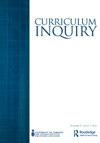Undoing human supremacy and white supremacy to transform relationships: An interview with Megan Bang and Ananda Marin
IF 1.6
3区 教育学
Q2 EDUCATION & EDUCATIONAL RESEARCH
引用次数: 11
Abstract
Abstract Megan Bang (Ojibwe and Italian descent) is a Professor of the Learning Sciences and Psychology at Northwestern University and is currently serving as the Senior Vice President at the Spencer Foundation. Dr. Bang’s research focuses on the complexities of navigating multiple meaning systems in creating and implementing more effective and just learning environments in science, technology, engineering, arts, and mathematics education. Ananda Marin (African American, Choctaw [non-enrolled], European American descent) is an Assistant Professor of Social Research Methodology in UCLA’s Department of Education and faculty in American Indian Studies. Her research explores questions about the cultural nature of teaching, learning, and development. This interview with two Indigenous scholars provides educators with a chance to explore the possibilities of Indigenous worldviews on their climate change praxis. The scholars ask educators to consider how white and human supremacy are perpetuated in current educational paradigms. They discuss the necessity of transformations between relationships between humans and the natural world in fighting climate change. Bang and Marin underline the importance of education that immerses children in learning with places, paying attention to embodied, relational, axiological, and world-building dimensions of storying with lands.废除人类至上主义和白人至上主义,改变人际关系:对Megan Bang和Ananda Marin的采访
梅根·邦(Megan Bang)是美国西北大学学习科学与心理学教授,现任斯宾塞基金会高级副总裁。Bang博士的研究重点是在科学、技术、工程、艺术和数学教育中创建和实施更有效、更公正的学习环境时,导航多重意义系统的复杂性。阿南达·马林(非裔美国人,乔克托族[未入学],欧裔美国人后裔)是加州大学洛杉矶分校教育系社会研究方法论助理教授,也是美国印第安人研究系的教员。她的研究探讨了教学、学习和发展的文化本质问题。这次对两位土著学者的采访为教育工作者提供了一个机会,探索土著世界观在气候变化实践中的可能性。学者们要求教育工作者考虑白人和人类至上是如何在当前的教育范式中延续下去的。他们讨论了在应对气候变化的过程中,人类与自然世界关系转变的必要性。Bang和Marin强调了教育的重要性,让孩子们沉浸在与地方的学习中,关注与土地有关的故事的具体、关系、价值论和世界建设的维度。
本文章由计算机程序翻译,如有差异,请以英文原文为准。
求助全文
约1分钟内获得全文
求助全文
来源期刊

Curriculum Inquiry
EDUCATION & EDUCATIONAL RESEARCH-
CiteScore
3.10
自引率
17.60%
发文量
37
期刊介绍:
Curriculum Inquiry is dedicated to the study of educational research, development, evaluation, and theory. This leading international journal brings together influential academics and researchers from a variety of disciplines around the world to provide expert commentary and lively debate. Articles explore important ideas, issues, trends, and problems in education, and each issue also includes provocative and critically analytical editorials covering topics such as curriculum development, educational policy, and teacher education.
 求助内容:
求助内容: 应助结果提醒方式:
应助结果提醒方式:


